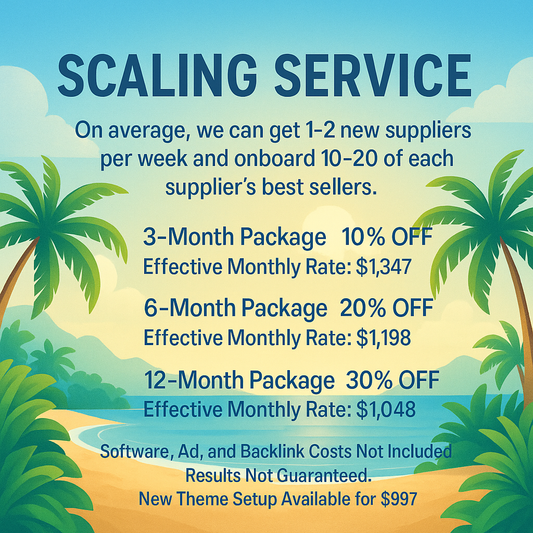
Unlocking SEO: Mastering Keyword Research for Shopify
Hey E-commerce enthusiasts! Trevor Fenner here, founder of Ecommerce Paradise. If you want to take your Shopify store to the next level, understanding how to conduct keyword research is absolutely essential. In today's digital landscape, optimizing your store for search engines can drive significant traffic and ultimately lead to increased sales. So, let’s dive into how you can conduct effective keyword research tailored for your Shopify store.
Understanding the Importance of Keyword Research
Keyword research is the backbone of effective SEO strategies. It’s not just about picking popular phrases; it’s about understanding your audience's intent. Whether you are dropshipping products or promoting your latest email marketing campaign, knowing the right keywords can set you apart from the competition. The right keywords will not only help improve your store's visibility but also attract potential buyers who are genuinely interested in your offerings.
What Are Keywords?
Keywords are the phrases or words that people enter into search engines when they are looking for information. When you choose the right keywords—those that match what your target audience is searching for—you can optimize your website content more effectively. This is where Shopify's SEO capabilities become an invaluable asset for your online store.
Step-by-Step Guide to Conducting Keyword Research
Step 1: Brainstorm Seed Keywords
Start with some brainstorming! Think about the core products or services you are offering. Write down a list of keywords that resonate with what you're selling. If you are involved in dropshipping, consider what specific niches or categories you want to target. This initial list will form your base for further research.
Step 2: Use SEO Tools for Further Exploration
After creating your seed keywords, it’s time to turn to SEO tools. Tools like Google Keyword Planner, Ubersuggest, and Ahrefs can provide valuable insights into search volume, competition, and related queries. By entering your seed keywords into these tools, you can unlock a treasure trove of additional keyword ideas. Look for keywords that have a high search volume but lower competition, as they can be easier to rank for on Google.
Step 3: Analyze Competitor Keywords
Competitive analysis is a powerful strategy in keyword research. Identify your top competitors within the eCommerce space and take note of the keywords they are ranking for. SEO tools often have a feature where you can input a competitor’s domain to see which keywords they have optimized for. This can provide insight into what might work for your Shopify store, especially if they are successful in areas where you hope to compete.
Step 4: Understand Long-Tail Keywords
Don’t ignore long-tail keywords! These are phrases that include three or more words and are often more targeted. Long-tail keywords can help you attract a specific audience that has a higher intention to purchase. For example, instead of targeting a broad term like "shoes", you might want to focus on "affordable running shoes for women." Long-tail keywords are generally less competitive and can significantly improve your chances of ranking well in search results.
Step 5: Prioritize Keywords Based on Intent
Not all keywords are created equal. It's crucial to understand the intent behind each keyword. Generally, the search intent can be categorized into three types:
- Informational: Users are looking for information (e.g., "How to choose the best running shoes?").
- Navigational: Users want to find a specific website (e.g., "Nike official site").
- Transactional: Users are ready to make a purchase (e.g., "buy running shoes online").
For eCommerce SEO, your focus should be heavily on transactional keywords, as they imply that the user is ready to buy. Incorporating them into your product descriptions, landing pages, and ads will position you better in search results.
Implementing Keywords into Your Shopify Store
Optimizing Your Product Pages
Once you’ve identified your target keywords, it’s time to implement them into your Shopify store. Start with your product pages, as these are the most crucial for converting visitors into customers. Ensure your keywords are naturally integrated into:
- Product titles
- Meta descriptions
- Product descriptions
- Image alt texts
This will bolster your chances of ranking higher in search results when potential buyers are searching for those key terms.
Creating Informative Blog Content
In addition to product pages, leveraging a blog is one of the best ways to improve your store’s SEO. Create articles around relevant topics that incorporate your keywords. For example, write posts like "Top 10 Running Shoes for Beginners" and sprinkle your keywords throughout the content. This will help attract organic traffic and can even enhance your email marketing efforts by providing valuable content to share with your subscribers.
Leveraging Google Shopping Ads and Other Channels
Using Google Shopping Ads
If you are serious about getting visibility, consider investing in Google Shopping Ads. With these ads, you can showcase your products directly in Google’s search results. Just ensure that the keywords you target in your ads align with the product listings on your store. This consistency will enhance your marketing strategy and improve your chances of conversion.
Boosting Visibility with Email Marketing
Email marketing is another powerful tool to consider. By using the keyword data you've gathered, you can craft emails that resonate with your audience's search intent. Providing relevant content, product offers, and guides can lead to higher engagement and ultimately drive more sales.
Monitoring and Adapting Your Strategy
Use Analytics to Measure Success
Keyword research doesn’t end once you've implemented them into your store. You must monitor their performance continuously. Utilize tools like Google Analytics and Google Search Console to track how your keywords are performing. Look for key metrics such as organic traffic, bounce rates, and conversion rates.
By analyzing this data, you can make informed decisions to tweak your keyword strategy. If certain keywords aren’t performing as well as you hoped, don’t be afraid to explore new ones and adapt your approach accordingly.
Stay Updated
The world of SEO is dynamic, and trends can change rapidly. Keep yourself updated on the latest strategies and changes in search algorithms. Consider following SEO blogs, joining communities, or attending webinars focused on eCommerce SEO. This ongoing learning will ensure your Shopify store remains competitive and effective in attracting the right audience.
Your Journey to Success Starts Today!
Conducting keyword research for your Shopify store doesn't have to be daunting. By following these steps and implementing an effective SEO strategy, you can significantly enhance your visibility, attract more visitors, and ultimately increase your sales. Remember, consistent effort and monitoring your performance are key to long-term success. So roll up your sleeves and get started today, because your eCommerce paradise is just around the corner!


















